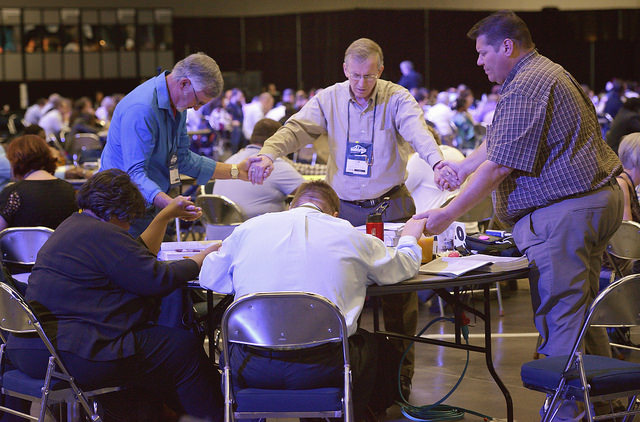Evangelical/orthodox United Methodists have reason to rejoice over the 2016 General Conference (GC). This quadrennial gathering of United Methodists may have been the most faithful to Scripture and to the UM Book of Discipline (BOD) of any that have been held in the past forty years.
Some historical perspective may be helpful. United Methodism’s low point came during the 1993-1996 period. In 1993 the blasphemous Re-Imagining Conference was sponsored by the women of various Mainline Protestant churches, including United Methodists. The goddess Sophia was worshiped and the doctrine of the Atonement was ridiculed. In 1996, fifteen United Methodist bishops went public prior to General Conference in an attempt to influence that Conference to change the Church’s standards regarding homosexual conduct. Thankfully, their attempt failed. Nevertheless, liberal United Methodists were convinced that the same leftward trends influencing the United States would cause the UMC to “evolve” in a liberal direction.
But other dynamics were at work. The aggressiveness of the liberal lobby (including LGBTQ and allies) evoked a conservative reaction. Several new orthodox reform groups, like the Confessing Movement and UMAction, were organized. Reform groups were formed in many annual conferences.
Meanwhile, the UMC was changing because of membership gains and losses. The UMC in the U.S. was losing about 90,000 members per year, especially in its most liberal areas — the West and Northeast. And the more conservative sections of the U.S. church were either growing or at least holding their own. More importantly, the UMC in Africa was gaining over 200,000 members per year, and most of them were orthodox/evangelical in theology. Since the allocation of General Conference delegates is determined by membership, conservatives increased and liberals decreased.
For the past 25 years, the central polarizing issue at General Conference has been the issue of homosexuality. Liberals have attempted to remove from the Book of Discipline (BOD) the statement that homosexual practice is “incompatible with Christian teaching.” Also, they have sought to promote same-sex marriage and to allow practicing homosexuals to be ordained. While these have been the presenting issues, the more important and underlying issue has been the AUTHORITY OF SCRIPTURE. Many liberals regard the Bible as a “living document” that must evolve with the changing times. Conversely, most conservatives believe the Bible to be the inspired and changeless word of God, or as the BOD states, “the true rule and guide for faith and practice.”
While General Conferences between 2000 and 2012 featured some significant gains by conservatives (For example, retaining the prohibition of homosexual practice and opposing partial-birth abortion), most of them were inconclusive in terms of the Church’s overall direction. The most publicized events were the loud, disruptive demonstrations inside the Conferences by LGBTQ supporters.
The 2016 GC was qualitatively different. Some early indications of the dominance of conservatives were these:
- The much debated “Rule 44” was voted down; it would have mandated that much of the GC be devoted to small-group discussions of sexuality issues.
- Several petitions in legislative committees that would change the definition of marriage to a relationship “between two persons” failed by substantial margins.
- A motion passed to require the General Board of Global Ministries to withdraw from a campaign to stop investments in Israel.
During the last few days of GC, the really significant events occurred:
- When committee votes made it abundantly clear that the liberals would lose on the sexuality issues, the bishops stepped in and proposed that all sexuality issues be postponed until a special GC could be held, possibly in 2018. This means that the current UM position on sexual issues remains in force. Some conservatives and moderates likely voted for this proposal because they feared that the liberals might filibuster the sexual issues in order to run out the clock. Other significant issues needed to be addressed.
- The Women’s Division and the General Board of Church and Society will be required to withdraw from the Religious Coalition for Reproductive Choice (RCRC). That organization opposes any and all restrictions on abortion, including restrictions on late-term and partial-birth abortions.
- Almost all the new members of the Judicial Council (United Methodism’s Supreme Court) have pledged to interpret the BOD exactly as it is written. Almost all were supported heavily by conservative delegates.
- The African part of the UMC (approximately 40 percent of our total membership) exerted its influence in most significant ways. Its orthodox/evangelical commitment was obvious and powerful.
The UMC is the only mainline denomination in the United States that has not bought into the liberal agenda. There seems to be honest reason for optimism that the UMC, thanks especially to the African influence, might recover its vitality as an evangelistic organization.
It is ironic and remarkable that when American Methodists were sending missionaries to Africa 150 years ago, no one could have imagined that in 2016 those African Methodists would rise up and save orthodoxy within the UMC. How wonderfully strange it is that God often takes the least affluent parts of his church and uses them to renew and reform the more affluent parts!
For all those who cherish the theological and biblical heritage of Methodism, we have cause to rise up and thank God for General Conference 2016.
Rev. Dr. Bill Bouknight is a retired United Methodist minister, a member of the Memphis Annual Conference. He was educated at Duke, University of Edinburgh- Scotland, and Yale Divinity School. He served churches in South Carolina for 28 years. From 1994 until 2007 he served as Senior Minister of Christ UMC in Memphis, TN. Currently he is a part-time Associate Director of the Confessing Movement within the United Methodist Church
UMVoices is a forum for different voices within the United Methodist Church on pressing issues of denominational concern. IRD/UMAction does not necessarily endorse every view expressed by UMVoices contributors, nor do UMVoices contributors necessarily endorse every view expressed by IRD.





Comment by Skipper on June 2, 2016 at 5:23 pm
Thanks for this informative and most encouraging report!